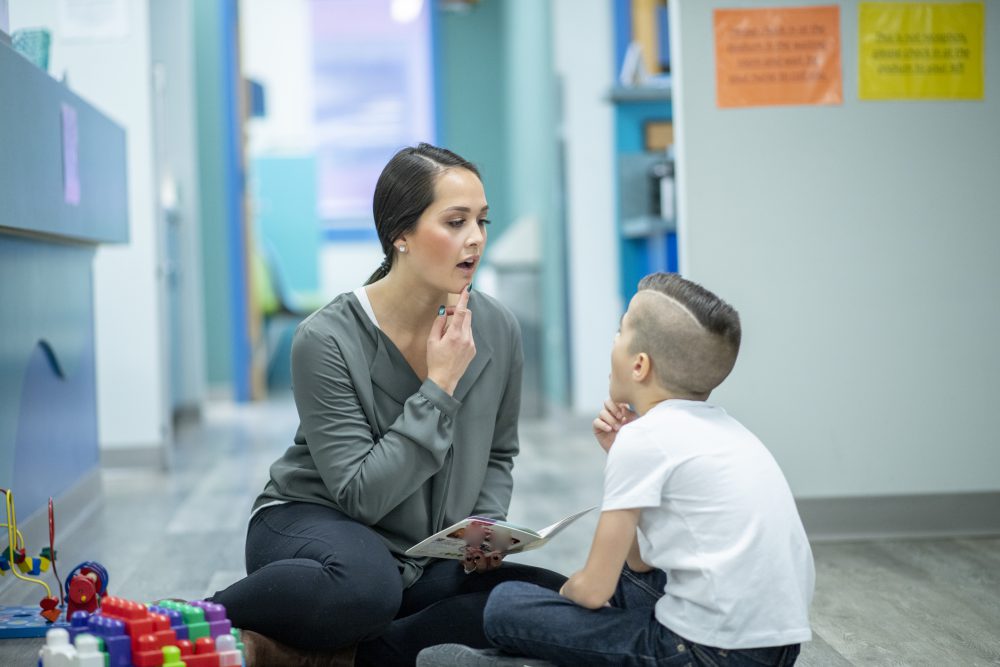When Should You Consult a Speech Pathologist for Language Disorders?
When Should You Consult a Speech Pathologist for Language Disorders?
Blog Article
How a Speech Pathologist Can Aid Improve Interaction Skills
Efficient communication is a foundation of professional and personal success, yet numerous people encounter difficulties that prevent their capability to reveal themselves plainly. A speech pathologist is equipped to address these barriers via targeted assessment and intervention methods customized to every individual's needs. By utilizing evidence-based healing techniques, they not just function to boost speech and language problems yet also improve overall communicative proficiency. Understanding the complex duty of a speech pathologist discloses how their knowledge can transform lives, inviting a better evaluation of the specific approaches and results connected with their method.
Comprehending Interaction Conditions
Comprehending interaction disorders is vital for acknowledging exactly how they affect individuals' capacity to express themselves and engage with others. Communication disorders include a large variety of difficulties that influence speech, language, and social interaction, frequently impeding reliable communication. These conditions can emerge from different elements, including neurological problems, developmental delays, physical problems, or mental issues.
Speech conditions might manifest as problems in expression, fluency, or voice manufacturing, affecting exactly how words are noticable or talked. Language problems, on the other hand, involve difficulties in understanding or making use of language, which can hinder both spoken and non-verbal interaction. Social communication disorders are defined by problems in the practical facets of interaction, such as taking turns in conversation or understanding social signs.
The consequences of interaction problems are profound, impacting not only the person's ability to convey thoughts and emotions but also their social relationships, educational chances, and total top quality of life. Recognition of these problems can cultivate compassion and assistance, motivating efficient methods for interaction and involvement. Recognizing the intricacies of communication conditions is a vital action towards promoting inclusivity and attending to the needs of those affected.
Role of a Speech Pathologist
Speech pathologists frequently play an essential duty in treating and detecting communication problems, utilizing a series of evidence-based techniques customized to every individual's needs. These specialists collaborate with people throughout the life expectancy, from children with speech hold-ups to adults recovering from strokes or traumatic mind injuries. Their expertise incorporates a selection of communication concerns, consisting of articulation, fluency, language, and voice problems.
In restorative settings, speech pathologists use structured treatments developed to boost interaction skills. They might execute approaches such as speech workouts, language games, and social interaction training to help with renovations in receptive and meaningful language abilities. Speech Pathologist. Furthermore, they inform customers and their families concerning effective interaction strategies and adaptive approaches to navigate daily interactions
Beyond straight therapy, speech pathologists team up with various other health care specialists, caregivers, and teachers to make sure a comprehensive method to therapy. They support for clients by offering resources and assistance, enabling people to attain their interaction goals and improve their general high quality of life. As specialists in the area, speech pathologists are necessary in cultivating effective communication, promoting self-reliance, and improving social involvement for those with interaction difficulties.
Analysis and Medical Diagnosis Process
The assessment and diagnosis process conducted by speech pathologists generally includes an extensive examination to determine communication conditions precisely. This process begins with a comprehensive medical history, where the clinician gathers relevant information about the individual's Recommended Reading clinical, instructional, and developing history. Comprehending the context of the individual's communication troubles is vital for an accurate medical diagnosis.
Adhering to the instance background, speech pathologists make use of standard tests and informal assessments to examine different aspects of interaction, consisting of speech noise production, language understanding, meaningful language, and social communication abilities. These analyses are tailored to the individual's age and details worries, offering useful data for analysis.
Monitoring is likewise a vital component of the analysis process, as it permits the clinician to see direct exactly how the individual connects in natural setups. Furthermore, meetings with relative and instructors can provide insight into the person's interaction obstacles across various environments.
Once the evaluation is total, the speech pathologist manufactures the findings to establish a diagnosis and advise suitable interventions. This thorough evaluation procedure guarantees that people receive targeted support customized to their unique interaction demands, laying the foundation for reliable therapeutic methods.
Healing Techniques and Methods
Countless therapeutic methods and approaches are employed by speech pathologists to attend to a selection of communication disorders successfully. One extensively utilized method is articulation treatment, which concentrates on correcting speech sounds with repeating and aesthetic signs. This technique is particularly helpful for people with speech audio problems.
Another effective technique is language treatment, which improves both meaningful and responsive language abilities. This may involve interactive tasks that promote vocabulary advancement, syntax understanding, and conversational abilities. In addition, speech pathologists often use social skills training to improve pragmatic language abilities, enabling individuals to browse social communications extra efficiently.
Fluency shaping and stuttering alteration methods are particularly developed to help those experiencing fluency disorders. These approaches help customers create smoother speech patterns and take care of the emotional and physical parts of stuttering.
Additionally, augmentative and different communication (AAC) systems are employed for people with serious communication disabilities. These systems, which can consist of motions, signs, or electronic devices, give crucial assistance for efficient communication.
Advantages of Speech Therapy

In addition, speech treatment can help in establishing vital listening and understanding abilities, promoting better communication in discussions. Individuals with cognitive-communication disorders can additionally profit, as therapy concentrates on reinforcing memory and analytical capabilities, vital for effective interaction.
One more crucial facet is the psychological support given during therapy sessions. Speech pathologists produce a safe environment, motivating individuals to overcome anxiousness and stress associated to their communication concerns. This support can bring about improved self-worth and general psychological wellness.
Moreover, very early intervention with speech treatment can stop more issues, ensuring that people reach their complete communicative capacity. In general, the advantages of speech therapy prolong past mere speech renovation, positively affecting site here numerous dimensions of life for those impacted by interaction problems.
Conclusion
In summary, speech pathologists play a critical role in attending to interaction disorders with analysis, diagnosis, and tailored restorative treatments. By utilizing evidence-based strategies, these professionals improve people' speech and language capacities, fostering improved clearness, fluency, and social communication abilities. The advantages of very early intervention emphasize the significance of looking for aid from speech click to read pathologists, as their know-how can significantly improve communicative potential, ultimately resulting in higher success in both individual and specialist rounds.

Speech pathologists often play an essential duty in dealing with and detecting communication conditions, utilizing an array of evidence-based techniques tailored to each individual's requirements. As specialists in the area, speech pathologists are essential in cultivating effective communication, promoting self-reliance, and improving social engagement for those with interaction challenges.

Report this page